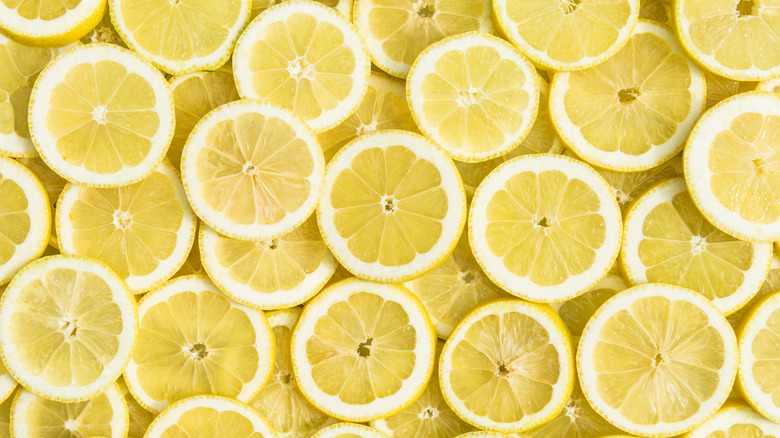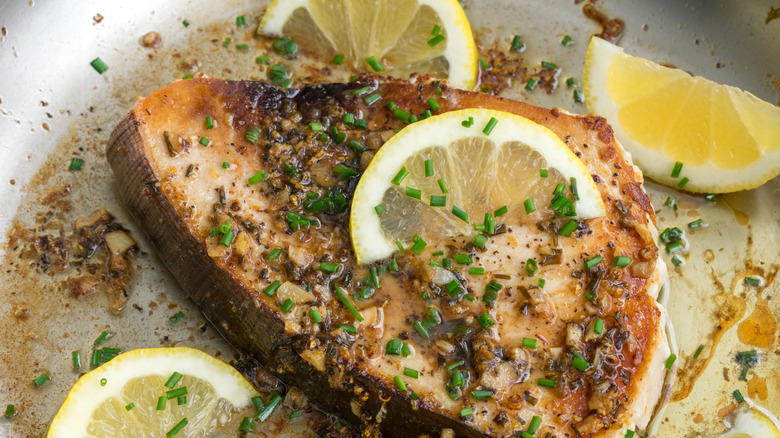Why You Should Think Twice Before Using Restaurant Lemon Wedges
No matter what you order at a restaurant, you're bound to see a lemon wedge or two at some point. It's present in abundance at salad bars, it is almost always served alongside seafood, and the citrus is used generously as a garnish in drinks. Whether it's a jug of water, a fizzy glass of coke, a pitcher of iced tea, an icy cocktail, or even just a bottle of Corona, lemon wedges are everywhere. But did you know that these same wedges are among the least sanitary items at restaurants, especially when they're floating about in your drinks? Even worse — they are packed with germs and bacteria.
A 2007 study published in the Journal of Environmental Health tested the flesh and rinds of 76 lemon slices tucked on the glass rims of 21 restaurants and the results were staggering. The data collected over 43 visits indicated that nearly 70% of the lemon slices had microbial growth on them. A total of 25 microorganisms were found lurking in restaurant lemons which included bacteria like E. coli and yeasts — imagine all of that swirling in your food and drinks. It's even worrisome when the lemons are wet as The Conversation points out, whose 2017 study determined that E. coli could transfer from hands to wet lemons 100% of the time.
Lemon wedges are filled with yeast and bacteria
The Journal of Environmental Health's report points out several potential sources for the yeast and bacteria contamination in lemon wedges served at restaurants. For one, there were traces of human fecal or raw meat and poultry on the citruses. These could have been transferred either from the fingertips of workers while handling the lemons, or could have been present before the lemons even got to the restaurant. Oral flora or skin contact could have also caused contamination, as could the knife that was used to prep the lemons.
One of the biggest reasons for this contamination could be improper cleaning. Restaurants often rinse lemons rather than scrub them thoroughly, leaving plenty of bacteria living inside untouched. Another reason is subpar hygiene: An undercover report commissioned by ABC News in 2012 revealed that employees were using bare hands to pick up lemon wedges. Bartenders not using tongs or gloves when garnishing drinks with lemons or chefs using cross-contaminated knives to prep them may explain the presence of all those germs and bacteria.
Philip Tierno, a clinical professor at New York University School of Medicine, went on to tell Elle that he has conducted several studies on the lemon wedges served at restaurants and the results are always similar. There are bacteria from respiratory secretions, skin contamination, and fecal waste, which lead to the presence of things like E. coli, norovirus, enterococcus, and staph on the skins of the wedges.
Should you be worried about the lemon wedges in your food and drinks?
Lemons go through several stages before they reach your table: Someone washes and dries them, another worker preps and slices them, a glass or a tray is used to store them, and someone else picks them again to place them in your plates and glasses. Considering the many people who touch the fruit before it reaches your table, something as little as improper hand washing could open the lemon wedges up to a truckload of bacteria.
While the presence of such bacteria is undeniable, the amount of damage that they can do is questionable. The Journal of Environmental Health study specifies that while the microbes found on restaurant lemons had the potential to cause infections, there were no reports of food-borne illnesses caused due to lemon wedge-filled drinks thus far. Furthermore, it's not just lemon wedges that contain these contaminants; even menus, salt and pepper shakers, and bottles of ketchup are filled with bacteria, as are other garnishes like cherries and limes.
While there's no way of knowing how safe the lemon wedges in your food and drinks are, there are ways to lessen the exposure to them. Ask for lemon wedges on the side, squeeze their juice into your drinks, and avoid dropping the wedges into your beverage if possible. That said, even the flesh of the lemons can have bacteria so your best bet is to avoid the wedges entirely when dining at restaurants and leave the lemon-laced drinks for home.



